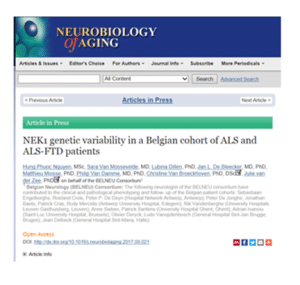Recent research on Parkinson’s disease has focused on the gut-brain connection, examining patients’ gut bacteria, and even how severing the vagus nerve connecting the stomach and brain might protect some people from the debilitating disease.
But scientists understand little about what’s happening in the gut — the ingestion of environmental toxins or germs, perhaps — that leads to brain damage and the hallmarks of Parkinson’s such as tremors, stiffness and trouble walking.
Now researchers have identified a potential new mechanism in both mice and human endocrine cells that populate the small intestines. Inside these cells is a protein called alpha-synuclein, which is known to go awry and lead to damaging clumps in the brains of Parkinson’s patients, as well as those with Alzheimer’s disease.
The study was published in JCI Insight.
The researchers hypothesized that an agent in the gut might interfere with alpha-synuclein in gut endocrine cells, deforming the protein. The deformed or misfolded protein might then spread via the nervous system to the brain as a prion.
But how would a protein go from traveling through the inner-most 'tube’ of the intestine, where there are no nerve cells, into the nervous system? In a 2015 study, the same researchers showed that although the main function of gut endocrine cells is to regulate digestion, these cells also have nerve-like properties.
Rather than using hormones to communicate indirectly with the nervous system, these gut endocrine cells physically connect to nerves, providing a pathway to communicate directly with the nervous system and brain.
With the new finding of alpha-synuclein in endocrine cells, the researchers now have a working explanation of how malformed proteins can spread from the inside of the intestines to the nervous system, using a non-nerve cell that acts like a nerve.
The researchers plan to gather and examine the gut endocrine cells from people with Parkinson’s to see if they contain misfolded or otherwise abnormal alpha-synuclein. New clues about this protein could help scientists develop a biomarker that could diagnose Parkinson’s disease earlier.
New leads on alpha-synuclein could also aid the development of therapies targeting the protein.
Paper: “α-Synuclein in gut endocrine cells and its implications for Parkinson’s disease”
Reprinted from materials provided by Duke University Medical Center.


